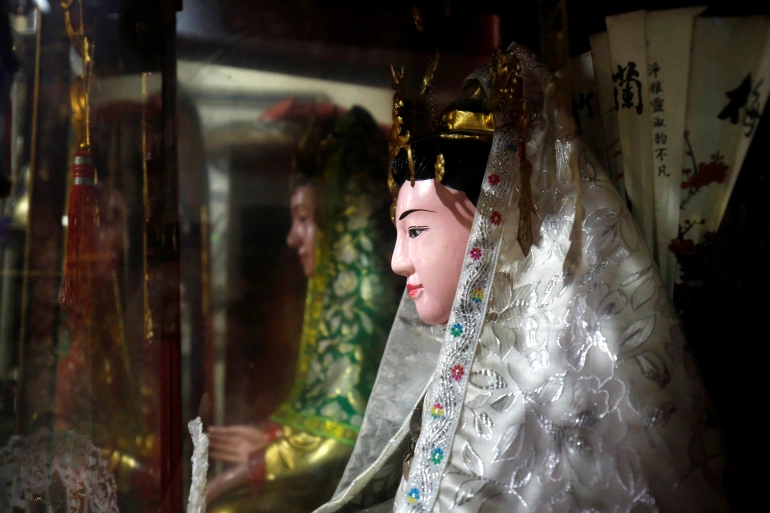In officially Communist Vietnam, fortune telling can guide everything from hiring to timing business trips.
Hanoi, Vietnam – Nguyen Duy Cuong, the owner of a building materials company in Ho Chi Minh, can hardly wait to ask his fortuneteller to look at his business plans for the Year of Tiger, which begins on February 1.
Cuong’s fortuneteller, who has advised him for the past 12 years, has been especially busy during the pandemic due to a growing client base drawn by the convenience of services offered online.
Like many Vietnamese when discussing a favoured fortuneteller, spirit medium or geomancer, Cuong refers to his guide as “Master”.
“In the next few weeks, Master’s schedule will be very hectic, so I have to book him well in advance,” Cuong, who was born in 1955, told Al Jazeera.
Cuong will rely on his fortuneteller’s advice for everything from the arrangement of the furniture in his office and hiring employees, to the timing of his business trips during the upcoming lunar year.
“I am doing pretty well this year despite the pandemic. It seems that my heartfelt gratitude to the spirits paid off,” said Cuong, who typically pays about 1 million Vietnamese dong ($45) for a two-hour consultation. “I have a lot to thank my Master for.”
Despite relying on superstitions, Cuong is insistent he can tell a real deal fortuneteller apart from fraudsters and opportunists.
“I trust science and my own intuition,” he said. “For inexplicable things in life, I must turn to Master. I am spiritual, but not superstitious”.
In Vietnam, many business owners, whether big or small, or private or state-owned, consult fortunetellers for guidance on corporate decisions.

While only about 14 percent of the population in officially Communist Vietnam practice a formal religion, usually Catholicism or Buddhism, spirituality permeates every nook and cranny of the society.
For many Vietnamese, consulting a fortuneteller is not only a way to gain peace of mind, but also express respect for supernatural forces. In Vietnamese culture, life and death are determined by fate, while prosperity and privileges rely on heaven. Success requires not only talent and hard work, but supernaturally-granted good fortune known as loc. To cultivate such good fortune, Vietnamese carry out rituals to express their gratitude to the heavens and their ancestors.
Cuong’s business, like many in Vietnam, contains an altar to the Chinese God of Wealth and the God of Land, at which his assistant – who was partly hired on the basis of his Chinese zodiac sign and appearance – prepares fruit offerings on the 1st and 15th day of the lunar month.
Master Dung, a 28-year-old horoscopist in Hanoi, told Al Jazeera that her clients most often sought readings about their health or business plans.
“The bigger and riskier their investment is, the more frequently clients seek fortunetelling,” said Dung, who asked to be referred to only by her business name.
Depending on familiarity with her clients, Dung offers different packages ranging from $9 to $36 per one-hour session.
Dung said that while fortune tellers based their advice on the horoscope, her approach focused on practical problem-solving.
“I always tell my clients that fate can be changed by their improved moral conduct, and my messages often sound positive, otherwise they will always feel bad and never come back,” Dung said.
In officially secular Vietnam, a clear distinction is made between formal religions and ritualistic practices such as palm reading and ancestral worship.
Following economic liberalisation in the 1980s, the Communist government relaxed its enforcement of war-time anti-superstition laws, under which many folk practices were deemed backward and inimical to the social order.
In 2006, the US State Department removed Vietnam from the list of “countries of particular concern” with respect to religious freedom.
Nonetheless, the country’s Religious Affairs Committee continues to monitor religious organisations and discourage the spread of “heterodox superstitions”.
Practitioners of divination, fortunetelling, spirit summoning and other forms of mysticism can be fined for profiting off of their activities, although the law is vague about the parameters of what is and is not allowed.
The legal grey area hasn’t stopped Communist Party members from availing of fortunetelling services themselves.
Among 15,101 Party members disciplined between 2016 and 2020, 7,692 were accused of involvement in gambling, reckless drinking, superstition, or supporting or participating in an illegal religious organization.
‘Age and fate’
For businesses, paying attention to supernatural concerns can also simply be a matter of ensuring things run more smoothly.
Tran Thanh Hoa, a young freelance designer in Da Nang, always brings up “spiritual” factors with his clients following an experience in which a client changed her mind about the colour of a logo after consulting with a fortuneteller.
The client was told blue would not be compatible with her year of birth and “fate”. After some back and forth, Hoa and his client opted for purple as a better fit.
“Since then, I have always asked my clients if they care about their logo’s compatibility with their age and fate”, Hoa told Al Jazeera. “I don’t think it is superstition. It is a valid concern because logos tell people what brands really stand for.”
Source: Al Jazeera


